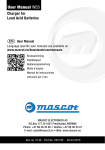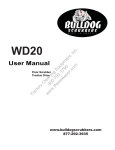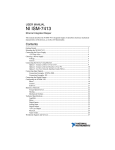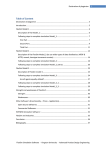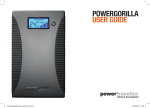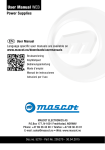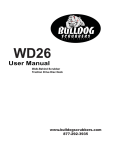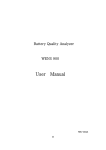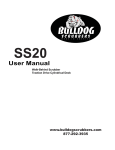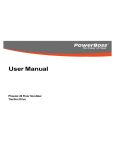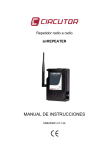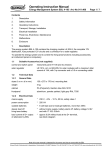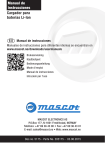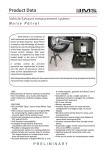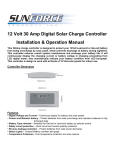Download User Manual WEB
Transcript
User Manual WEB Charger for LiFePO 4 Batteries EN User Manual Language specific user manuals are available on www.mascot.no/downloads/usermanuals Bruksanvisning Käyttöohjeet Bedienungsanleitung Mode d’emploi Manual de instrucciones Istruzioni per l’uso MASCOT ELECTRONICS AS P.O.Box 177, N-1601 Fredrikstad, NORWAY Phone: +47 69 36 43 00 • Telefax: +47 69 36 43 01 E-mail: [email protected] • Web: www.mascot.no Doc.no. 5240 - Part No. 205240 - 30.04.2015 IMPORTANT SAFETY INSTRUCTIONS! TO REDUCE THE RISK OF FIRE AND ELECTRIC SHOCK: READ THROUGH THESE INSTRUCTIONS PRIOR TO USING THE PRODUCT. CAREFULLY FOLLOW THESE INSTRUCTIONS WHEN USING THE PRODUCT. RETAIN THESE INSTRUCTIONS FOR FUTURE REFERENCE. ding to standard EN/IEC 60529, but must not be immersed in water for longer periods of time. CAUTION! DOUBLE POLE / NEUTRAL FUSING! Products marked with the “double square symbol” are double insulated (Insulation Class II). Products without this mark are Class I (relies on safety earth for protection). WARNING: To avoid risk of electric shock, Class I products must only be connected to a supply mains with protective earth. This product is designed for indoor use. (Not applicable to products marked ”IP67”) IP41 IP44 IP67 A version of this product marked ”IP41” may be available. This version is protected against ingress of solid objects larger than 1.0 mm and the effects of vertically falling drops of water according to standard EN/IEC 60529. At the end of their service life electric and electronic equipment and their accessories shall not be discarded with the municipal waste but be disposed of using separate collection, treatment, recovery/recycling and environmentally sound disposal. This also applies to any potentially bio hazardous parts and accessories. If in doubt; contact your local authorities to determine the proper method. A version of this product marked ”IP44” may be available. This version is protected against ingress of solid objects larger than 1.0 mm and the effects of water splashed against the enclosure from any direction according to standard EN/IEC 60529. A version of this product, marked with a symbol with two drops of water and/or ”IP67”, may be available. This version is filled with a potting compound and is dust-tight and protected against the effects of temporary immersion in water accor- Technical specifications for your product: See tables, the marking on the product or www.mascot.no 2 Cautions to observe prior to use • The intended use for this product is to charge a battery or a battery powered electrical accessory (NiCd/NiMH, Lead-Acid, Lithium-Ion or LiFePO4 batteries) or to be used as a Power Supply to power an electrical accessory. Please see the marking on the product you have to verify the type of product you have and read the applicable instructions and technical specifications included with this manual. • The product is “switched on” by inserting the mains plug into the mains socket and “switched off” by disconnecting the mains plug from the mains socket. • The product may be connected to an IT type mains supply. • For use in U.S.A.: - Be sure to use 125V 15A receptacle configuration before plugging in. - Use a UL817-standard compliant mains cord (plug type NEMA 1-15, cord type SJT or SVT). • This product may be used by unskilled operators, under the condition that these instructions are followed. • For use outside U.S.A: Use a mains cord compliant with the country specific requirements. • Unskilled operators may contact the supplier or manufacturer for assistance, if needed, in setting up, using or maintaining this product and to report unexpected operation or events. • The time from powering this product until its full function starts may exceed 15 seconds. • This appliance can be used by children aged from 8 years and above and persons with reduced physical, sensory or mental capabilities or lack of experience and knowledge if they have been given supervision or instruction concerning use of the appliance in a safe way and understand the hazards involved. Children shall not play with the appliance. • Should an operational error or unexpected change in the performance occur during use; disconnect the product from the mains immediately by disconnecting the mains plug from the mains socket and contact the supplier • When not in use please think about disconnecting the product from the mains. This will reduce the risk of hazards, reduce the products environmental impact and save electricity costs. • Do not allow animals to come into contact with this product. Some animals are known to cause damage to cables etc which may be a potential for risk of electric shock and excessive temperatures. Also, cables and small parts may represent a strangulation risk for the animal. • To avoid overheating make sure there is sufficient room for the circulation of air around the product when in use. Do not cover it up. • Even though this product complies with relevant safety standards it should not be in contact with human skin for long periods as some people may get allergies or injuries from long-term contact with moderate temperatures and/or plastic materials. • If the product is equipped with a mains cord, please check that the cord is not damaged. If the cord is damaged, the product must not be used until the cord is replaced. Replacement should be carried out by qualified personnel. • Prior to using this product with accessories and/ or interconnected equipment please carefully read its respective User Manuals. • The mains socket outlet used should always be easily accessible to facilitate immediate removal of the products mains supply should an operational error occur during use. If the product has a detachable mains cord the appliance coupler may be used as a disconnect device. • If the product is supplied with exchangeable output plugs, please see separate page for assembly. 3 • Output cables having a modular plug ( similar to a telephone connector) must never be connected to a telephone outlet. nently wired to the building installation: Installation must only be carried out by qualified service personnel, following the below instructions: - The protective earth conductor must be min. 0.75 mm2. - Connect the protective earth conductor to the external protective earthing system. - Verify that the protective earth terminal used is connected to the external protective earthing system. - Verify the integrity of the external protective earthing system. • Products with a welded plastic housing are not repairable. Please contact your supplier for replacement part. • This product contains hazardous voltages and there are no user replaceable parts inside the product. Never attempt to remove the cover. • WARNING: No modification of this equipment is allowed. Any repair/service should be carried out by qualified personnel who may get assistance by contacting the manufacturer or the manufacturer’s agent. • This product converts the mains voltage to a safety extra low voltage. Some products may be treated as Applied Part (Type BF) according to standard EN/IEC 60601-1 and may come in physical contact with a patient. • Products specified to have automatic polarity protection must be switched off if a battery is connected with reverse polarity. The protection will be automatically reset when the polarity has been corrected. • This product must be operated in an environment within temperature range +5 to +40°C, humidity 15 - 93 % RH and atmospheric pressure 70 - 106 kPa (700 - 1060 hPa). • In chargers specified to have a replaceable fuse as polarity protection the fuse must be replaced if the battery has been connected with reverse polarity. When replacing the fuse; a fuse of the same type and rating must be used. • Expected service life of this product and accessories delivered with this product is three (3) years, if operated as indicated above. However; the guarantee times indicated in document ”TERMS OF SALES AND DELIVERY FOR MASCOT AS” apply (available at www.mascot.com). • If the product is specified to comply with the standard for Medical Electrical Equipment (standards based on IEC60601-1) it complies with some of the requirements for medical electrical equipment and may be used in medical applications and hospital environments. • Environmental parameters during transport and storage between uses: temperature range -25 to +85 °C, humidity 15 - 93% RH NC and atmospheric pressure 70 - 106 kPa (700 - 1060 hPa). • The product must not be used in the vicinity of flammable anesthetic gases or in other environments with flammable or explosive atmosphere. • If stored for longer periods of time the environmental parameters should be within the temperature range +5 to +35°C, humidity range 10 - 75% RH NC and atmospheric pressure 70 - 106 kPa (700 - 1060 hPa) to maintain the products expected service life. • If the product is specified to comply with the standard for Medical Electrical Equipment for Home Healthcare Environment (standard IEC60601-1-11) it may be used in medical applications used in a home healthcare environment. • Expected shelf life of this product is one (1) year, if stored as indicated above. • This product complies with the requirements to electromagnetic compatibility for medical electric equipment and for use in residential, office or light industrial environment but all electric NOTE: Products relying on safety earth for protection (Class I) may not be used in home healthcare environment unless they are perma4 degraded by such chemicals. Also make sure to position, operate and store such products away from UV-light and direct sunlight. products imply a potential for electromagnetic or other interference between the product and other devices. If such interference is suspected please disconnect the product from the mains and consult a qualified technician, your supplier or the manufacturer. • Position, operate and store this product only under reasonable foreseeable environmental conditions with respect to magnetic fields, EM-fields, electrostatic discharges, pressure or variations in pressure, acceleration etc. • No special maintenance procedure is required but if the product gets dusty or dirty it should be wiped clean using a dry cloth while the product is disconnected from the mains. No other maintenance should be necessary. • If this product is used with or mounted in a vehicle it may only be used when the vehicle is not in use. • For products having a plastic casing, please avoid any contact with lotions, oils, grease and solvents as most types of plastic may be • When in use, position this product so that the label can be read – within 40 cm of the operator. Cautions to observe prior to charging LiFePO 4 -batteries •LiFePO4 chargers are designed for charging LiFePO4 (LFP) batteries only. Make sure you have the correct battery charger for the chemistry and number of cells in series. If the number of cells in series in the battery pack is not known you can calculate it by dividing the voltage indicated by 3.2VDC for LiFePO4 (e.g. a 12.8VDC LFP battery contains 4 LiFePO4 cells). Make sure the charge voltage indicated on the charger corresponds to the number of battery cells in series multiplied by 3.65VDC (e.g. a 4 cell LFP battery is typically charged using 14.6VDC). • Make sure the specifications for your battery allows for the environmental conditions present during charging. NOTE: The voltages indicated above are typical and may vary between battery types and battery makes. If in doubt; consult the specifications for your battery. • Please ensure correct polarity when connecting to the battery terminals. Reverse polarity connection may, in some chargers (see the chargers specifications), result in a fuse blowing, requiring replacement or leaving the charger useless. • Never attempt to charge batteries that are not rechargeable. • We recommend that you connect the charger to the mains before connection is made to the battery. This will reduce the sparks that may occur due to difference in potential between charger terminals and battery terminals. Note! Make sure the charger terminals are not short-circuited and ensure that the polarity is correct. • Make sure the specifications for your battery allows for the maximum charge current indicated on the charger. • The charge cycle starts when the charger is connected to the mains. 5 • If the charger is disconnected from the mains voltage during a charge cycle the charger will start a new charge cycle when it is reconnected to the mains. for a 1Ah battery should be max 2A. Thus the typical minimum capacity recommendation is 1Ah for a 2A charger. For max battery capacity we have used C/40 for chargers with timer (and/ or uC) and 100 times current detection levels for chargers using only this termination method. For a 2A charger with 0.2A current detection level the max capacity recommended will be 100 x 0.2A = 20Ah. Again this is just typical recommendations. Please read recommendations and datasheets from battery manufacturer. • The recommended minimum and maximum battery capacity for which the specific charger can be used vary from battery to battery. Please follow the datasheet and recommendations from the battery manufacturer. In our tables we use typical 2C as a maximum current for LiFePO4 cells. 2C means that charge current 6 Explanation of LiFePO 4 battery charge cycle (See tables for methods for each charger model.) Charging method A STEP 1 – BOOST CHARGE To start a charge cycle; connect the charger to the mains. The charger is in constant current mode, charging with the maximum current indicated on the charger, the LED-indication on the charger is ORANGE. This step allows rapid charging of your battery until the battery reaches typically 80 - 95% of its capacity. Orange Orange STEP 2 – TOP-UP CHARGE The charger is in constant voltage mode, charging with a decreasing current until the current is below the chargers charge termination level (indicated on the charger). The LED-indication on the charger is ORANGE. The battery is charged to its full capacity at the end of this step Orange STEP 3 –FLOAT CHARGE The LED-indication on the charger is GREEN and the battery is fully charged. The charge voltage is at float level and the charger may remain connected to the battery. The charger will return to Step 1 if the battery is used. A load larger than the cut-off current will initiate a new charge cycle. Orange Orange Green Green Yellow Green Yellow Yellow Yellow Yellow Diagram: A Yellow INDICATOR: ORANGE INDICATOR: GREEN Charge Voltage Charge Voltage Charge Current Cut-Off Current Step 1 Boost Charge Orange Step 2 Top-up Charge 7 Step 3 Float Charge Diagram: A Charging method B INDICATOR: ORANGE INDICATOR: GREEN STEP 1 – BOOST CHARGE To start a charge cycle; connect the charger to the Voltage mains. Charge The charger is in constant current mode, charging with the maximum current indicated on Charge Voltage the charger, the LED-indication on the charger is ORANGE. This step allows rapid charging of your battery until the battery voltage has increased to a certain set level  STEP 2 – TOP-UP CHARGE When the battery voltage has increased to a certain set level the charger enters constant Charge voltage mode, Current charging with a decreasing current until the current is below the chargers charge termination level (indicated on the charger). The LED-indication on the charger is ORANGE. When the battery has reached typically 90 - 95% of its full capacity the charge current has dropped below a set level and the LED-indication on the charger changes to YELLOW to indicate that the battery is almost fully charged and may be ready for use. The constant voltage charge continues and the battery reaches its full capacity at the end of this step Cut-Off Current  Step 1 Step 3 Step 2 STEP 3 - FLOAT CHARGE Boost Charge Float Charge Top-up Charge The LED-indication on the charger is GREEN and the battery is fully charged. The charge voltage is at float level and the charger may remain connected to the battery. The charger will return to Step 1 if the battery is used. A load larger than the cut-off current will initiate a new charge cycle. Lead acid diagrammer Orange Orange Orange Orange Orange Green Orange Green Orange Yellow Green Yellow Yellow Orange Yellow Yellow Yellow Green Yellow Diagram: B INDICATOR: ORANGE Yellow INDICATOR: YELLOW INDICATOR: GREEN Charge Voltage Charge Voltage Charge Current Cut-Off Current Step 1 Boost Charge Step 2 Top-up Charge 8 Step 3 Float Charge Charge Voltage Charging method C Charge Voltage Orange STEP 1 – BOOST CHARGE To start a charge cycle; connect the charger to the mains. Orange The charger is in constant current mode, charging with the maximum current indicated on Orange Voltageon the charger is ORANGE (or RED 9640). This step allows the charger, Battery the LED-indication Current pulses at safe float voltage level rapid charging of your battery until the battery reaches typically 80 - 95% of its for capacity. maximum topping of battery capacity. Pulse frequency: Microprocessor controlled. Pulse Current: max currentGreen Charge Current STEP 2 –TIMER CHARGE The charger is in constant voltage mode, charging with a decreasing current. The LED-indication on the charger is YELLOW. The charger is now in timer mode indicated by the YELLOW LED and will remain in this mode until time interval is completed. The battery is charged to its full capacity at the end of this step. Start Current Orange Orange Yellow Green Orange Yellow Cut-Off Current STEP 3 Low - FLOAT CHARGE Current Start-Up at Vbatt <10.5V Error Mode if <10.5V after 30 minutes The LED-indication on the charger is GREEN and the battery is fully charged. Yellow (for 12V system) For Li-Ion batteries the charge current is zero and the battery has been charged it its full Step 0 Step 1 Step 3Green Step 2 Startcapacity. Timer Boost Charge Float Charge Top Up Charge (4 hours) (0.5 hours) The charge voltage is at float level and the charger may remain connected to the battery. Yellow The charger will return to Step 1 if (72 the battery Safety Timer hours)is used. A load larger than the constant current level in Step 1 will initiate a new charge cycle. Lead acid diagrammer Yellow Yellow Diagram: C INDICATOR: ORANGE INDICATOR: YELLOW INDICATOR: GREEN Charge Voltage Charge Voltage Charge Current Cut-Off Current Step 1 Boost Charge Step 2 Timer Charge 9 Step 3 Float Charge How to connect exchangeable DC-output plugs 1. To connect for desired polarity, both plug ends are clearly marked. 3 3 2. When connected, the female plug is also marked on each side to identify plug polarity. 12 1 2 3. Shows the center polarity of the plug. How to connect exchangeable AC-plugs The following exchangeable AC plugs are available: Type 018110 - ”EURO” 250V 2.5A (EN50075/IEC83 C5 II) Type 018111 - ”US” 125V 2.5A (NEMA 1-15 / CSA-C22.2 No.42) Type 018112 - ”UK” 250V 13A (BS 1363) Type 018114 - ”AUS” 250V 10A (AS/NZS 3112) Mains Cord Set is available on request if you wish your product to be ”DeskTop” 10 11 2240 2241 2240 2241 2240 2241 Charge LED indicator 1 cell (3.2V) 6 cell (19.2V) 0.7A < 21.9V 21.9V > 100mA 21V < 100mA 0.35Ah – 10Ah 11 cell (35.2V) 0.4A < 40.2V 40.2V > 100mA 38.5V < 100mA 0.2Ah – 10Ah Orange CC ch.: 100-240Vac Orange CV ch.: 50-60Hz Green ch. complete: Rec. batt. capacity: Charge LED indicator Orange CC ch.: 100-240Vac Orange CV ch.: 50-60Hz Green ch. complete: Rec. batt. capacity: Input voltage Input voltage Charge LED indicator Orange CC ch.: 1.3A < 3.65V 100-240Vac Orange CV ch.: 3.65V > 100mA 50-60Hz Green ch. complete: 3.5V < 100mA Rec. batt. capacity: 0.65Ah – 10Ah Input voltage 0.37A < 43.8V 43.8V > 100mA 42V < 100mA 0.19Ah – 10Ah 12 cell (38.4V) 0.6A < 25.55V 25.55V > 100mA 24.5V < 100mA 0.3Ah – 10Ah 7 cell (22.4V) 1.3A < 7.3V 7.3V > 100mA 7V < 100mA 0.65Ah – 10Ah 2 cell (6.4V) 13 cell (41.6V) 0.56A < 29.2V 29.2V > 100mA 28V < 100mA 0.28Ah – 10Ah 8 cell (25.6V) 1.2A < 11V 11V > 100mA 10.5V < 100mA 0.6Ah – 10Ah 3 cell (9.6V) 0.33A < 47.45V 47.45V > 100mA 45.5V < 100mA 0.17Ah – 10Ah Charge diagram A 0.3A < 51.1V 51.1V > 100mA 49V < 100mA 0.15Ah – 10Ah 14 cell (44.8V) 0.5A < 32.85V 32.85V > 100mA 31.5V < 100mA 0.25Ah – 10Ah 9 cell (28.8V) 0.9A < 14.6V 14.6V > 100mA 14V < 100mA 0.45Ah – 10Ah 4 cell (12.8V) 0.27A < 58.4V 58.4V > 100mA 56V < 100mA 0.14Ah – 10Ah 15 cell (51.2V) 0.45A < 36.5V 36.5V > 100mA 35V < 100mA 0.23Ah – 10Ah 10 cell (32V) 0.8A < 18.3V 18.3V > 100mA 17.5V < 100mA 0.4Ah – 10Ah 5 cell (16V) 12 8.5A < 7.3V 7.3V > 3.5A 7.3V < 3.5A 7V < 300mA 4.25Ah – 30Ah 8.5A < 3.65V 3.65V > 3.8A 3.65V < 3.8A 3.5V < 300mA 4.25Ah – 30Ah Orange CC ch.: 220-240Vac Orange CV ch.: 50-60Hz Yellow CV ch.: Green ch. complete: Rec. batt. capacity: 220-240Vac 2440 2840 3240 3340 N.A. 4.5A < 7.3V 7.3V > 1.8A 7.3V < 1.8A 3.5V < 300mA 2.25Ah – 30Ah 4.5A < 3.65V 3.65V > 1.8A 3.65V < 1.8A 3.5V < 300mA 2.25Ah – 30Ah Orange CC ch.: 100-240Vac Orange CV ch.: 50-60Hz Yellow CV ch.: Green ch. complete: Rec. batt. capacity: 2541 2542 N.A. 2.7A < 7.3V 7.3V > 1.15A 7.3V < 1.15A 3.5V < 100mA 1.35Ah – 10Ah 2.7A < 3.65V 3.65V > 1.15A 3.65V < 1.15A 3.5V < 100mA 1.35Ah – 10Ah Orange CC ch.: 100-240Vac Orange CV ch.: 50-60Hz Yellow CV ch.: (20-60Vdc) Green ch. complete: Rec. batt. capacity: 2 cell (6.4V) 1 cell (3.2V) Input voltage Charge LED indicator Charge diagram B N.A. 8A < 11.0V 11.0V > 3.1A 11.0V < 3.1A 10.5V < 300mA 4Ah – 30Ah 4.5A < 11.0V 11.0V > 1.8A 11.0V < 1.8A 10.5V < 300mA 2.25Ah – 30Ah 2.3A < 11.0V 11.0V > 1.0A 11.0V < 1.0A 10.5V < 100mA 1.15Ah – 10Ah 3 cell (9.6V) N.A. 7A < 14.6V 14.6V > 2.7A 14.6V < 2.7A 14.0V < 300mA 3.5Ah – 30Ah 4A < 14.6V 14.6V > 1.6A 14.6V < 1.6A 14.0V < 300mA 2Ah – 30Ah 2.0A < 14.6V 14.6V > 0.85A 14.6V < 0.85A 14.0V < 100mA 1Ah – 10Ah 4 cell (12.8V) N.A. 5.5A < 18.3V 18.3V > 1.9A 18.3V < 1.9A 17.5V < 300mA 2.25Ah – 30Ah 3.9A < 18.3V 18.3V > 1.6A 18.3V < 1.6A 17.5V < 300mA 1.95Ah – 30Ah 1.6A < 18.3V 18.3V > 0.7A 18.3V < 0.7A 17.5V < 100mA 0.8Ah – 10Ah 5 cell (16V) 13 3.9A < 25.55V 25.55V > 1.6A 25.55V < 1.6A 24.5V < 300mA 1.95Ah – 30Ah 25A < 25.55V 25.55V > 10A 25.55V < 10A 21V < 3A 12.5Ah – 120Ah 3.3A < 21.9V 21.9V > 1.6A 21.9V < 1.6A 21V < 300mA 1.15Ah – 30Ah 4.6A < 21.9V 21.9V > 1.7A 21.9V < 1.7A 21V < 300mA 2.3Ah – 30Ah Orange CC ch.: 100-240Vac Orange CV ch.: 50-60Hz Yellow CV ch.: Green ch. complete: Rec. batt. capacity: Orange CC ch.: 220-240Vac Orange CV ch.: 50-60Hz Yellow CV ch.: Green ch. complete: Rec. batt. capacity: 25A < 21.9V Orange CC ch.: 21.9V > 10A Orange CV ch.: 2.9V < 10A 220-240Vac Yellow CV ch.: 21V < 3A Green ch. complete: Rec. batt. capacity: 12.5Ah – 120Ah 2541/ 2542 2440 2840 3240 3340 2.8A < 25.55V 25.55V > 0.8A 25.55V < 0.8A 24.5V < 300mA 1.4Ah – 30Ah 1.2A < 25.55V 25.55V > 0.5A 25.55V < 0.5A 24.5V < 300mA 0.6Ah – 10Ah 1.4A < 21.9V 21.9V > 0.6A 21.9V < 0.6A 21V < 100mA 0.7Ah – 10Ah Orange CC ch.: 100-240Vac Orange CV ch.: 50-60Hz Yellow CV ch.: (20-60Vdc) Green ch. complete: Rec. batt. capacity: 7 cell (22.4V) 6 cell (19.2V) Charge LED indicator Input voltage 2.8A < 36.5V 36.5V > 1.2A 36.5V < 1.2A 35V < 300mA 1.4Ah – 30Ah 17A < 36.5V 36.5V > 7A 36.5V < 7A 35V < 3A 8.5Ah – 120Ah 19A < 32.85V 32.85V > 7A 32.85V < 7A 31.5V < 3A 9.5Ah – 120Ah 22A < 29.2V 29.2V > 10A 29.2V < 10A 28V < 3A 11Ah – 120Ah 1.95A < 36.5V 36.5V > 0.8A 36.5V < 0.8A 35V < 200mA 1Ah – 20Ah 0.8A < 36.5V 36.5V > 0.35A 36.5V < 0.35A 35V < 100mA 0.4Ah – 10Ah 10 cell (32V) 3.1A < 32.85V 32.85V > 1.3A 32.85V < 1.3A 31.5V < 300mA 1.55Ah – 30Ah 2.2A < 32.85V 32.85V > 0.8A 32.85V < 0.8A 31.5V < 200mA 1.1Ah – 20Ah 0.9A < 32.85V 32.85V > 0.35A 32.85V < 0.35A 31.5V < 100mA 0.45Ah – 10Ah 9 cell (28.8V) 3.5A < 29.2V 29.2V > 1.4A 29.2V < 1.4A 28V < 300mA 1.75Ah – 30Ah 2.5A < 29.2V 29.2V > 0.8A 29.2V < 0.8A 28V < 300mA 1.25Ah – 30Ah 1A < 29.2V 29.2V > 0.4A 29.2V < 0.4A 28V < 100mA 0,5Ah – 10Ah 8 cell (25.6V) 14 1.7A < 58.4V 58.4V > 0.6A 58.4V < 0.6A 56V < 300mA 0.85Ah – 30Ah 11A < 58.4V 58.4V > 5A 58.4V < 5A < 1.3A 5.5Ah – 52Ah 2A < 51.1V 51.1V > 0.7A 51.1V < 0.7A 49V < 300mA 1Ah – 30Ah 13A < 51.1V 51.1V > 5A 51.1V < 5A 49V < 1.3A 6.5Ah – 52Ah 2.15A < 47.45V 47.45V > 0.8A 47.45V < 0.8A 45.5V < 300mA 1.1Ah – 30Ah 14A < 47.45V 47.45V < 5A 47.45V V < 5A 45.5V < 1.3A 7Ah – 52Ah 2.3A < 43.8V 43.8V > 0.9A 43.8V < 0.9A 42V < 300mA 1.15Ah – 30Ah 15A < 43.8V 43.8V > 5A 43.8V < 5A 42V < 1.3A 7Ah – 52Ah 2.8A < 40.15V 40.15V > 1.2A 40.15V < 1.2A 38.5V < 300mA 1.4Ah – 20Ah 15A < 40.15V 40.15V > 7A 40.15V < 7A 38.5V < 3A 7.5Ah – 120Ah Orange CC ch.: 220-240Vac Orange CV ch.: 50-60Hz Yellow CV ch.: Green ch. complete: Rec. batt. capacity: Orange CC ch.: Orange CV ch.: 220-240Vac Yellow CV ch.: Green ch. complete: Rec. batt. capacity: 2440 2840 3240 3340 1.65A < 43.8V 43.8V > 0.6A 43.8V < 0.6A 42V < 200mA 0.83Ah – 20Ah 1.5A < 47.45V 47.45V > 0.6A 47.45V < 0.6A 45.5 < 100mA 0.75Ah – 10Ah 1.4A < 51.1V 51.1V > 0.6A 51.1V < 0.6A 49V < 100mA 1.2Ah – 10Ah 1.2A < 58.4V 58.4V > 0.6A 58.4V < 0.6A 56V < 100mA 0.6Ah – 10Ah 0.6A < 58.4V 58.4V > 0.25A 58.4V < 0.25A 56V < 100mA 0.3Ah – 10Ah 1.8A < 40.15V 40.15V > 0.8A 40.15V < 0.8A 38.5V < 200mA 0.9Ah – 20Ah 0.6A < 51.1V 51.1V > 0.25A 51.1V < 0.25A 49V < 100mA 0.3Ah – 10Ah Orange CC ch.: 100-240Vac Orange CV ch.: 50-60Hz Yellow CV ch.: Green ch. complete: Rec. batt. capacity: 0.6A < 47.45V 47.45V > 0.25A 47.45V < 0.25A 45.5V < 100mA 0.3Ah – 10Ah 15 cell (51.2V) 2541/ 2542 0.7A < 43.8V 43.8V > 0.3A 43.8V < 0.3A 42V < 100mA 0.35Ah – 10Ah 14 cell (44.8V) 0.7A < 40.2V 40.2V > 0.3A 40.2V < 0.3A 38.5V < 100mA 0.35Ah – 10Ah 13 cell (41.6V) Orange CC ch.: 100-240Vac Orange CV ch.: 50-60Hz Yellow CV ch.: (20-60Vdc) Green ch. complete: Rec. batt. capacity: 12 cell (38.4V) 11 cell (35.2V) Charge LED indicator Input voltage 15 2040 2041 2042 2140 2040 2041 2042 2140 2040 2041 2042 2140 Charge LED indicator 11 cell (35.2V) Orange CC ch.: 1.4A < 40.15V 100-240Vac Orange CV ch.: 40.15V < 1.4A (½h) 50-60Hz Green ch. complete: 38.5V Rec. batt. capacity: 0.7Ah – 52Ah Input voltage Charge LED indicator 6 cell (19.2V) 2A < 21.9V 21.9V < 2A (½h) 21V 1Ah – 80Ah Charge LED indicator N.A. 1 cell (3.2V) Orange CC ch.: 100-240Vac Orange CV ch.: 50-60Hz Green ch. complete: Rec. batt. capacity: Input voltage Orange CC ch.: 100-240Vac Orange CV ch.: 50-60Hz Green ch. complete: Rec. batt. capacity: Input voltage 13 cell (41.6V) 2A < 29.2V 29.2V < 2A (½h) 28V 1Ah – 80Ah 8 cell (25.6V) 4A < 11V 11V < 4A (½h) 10.5V 2Ah – 160Ah 3 cell (9.6V) 1.3A < 43.8V 1.1A < 47.45V 43.8V < 1.3A (½h) 47.45V < 1.1A (½h) 42V 45.5V 0.65Ah – 48Ah 0.55Ah – 44Ah 12 cell (38.4V) 2A < 25.55V 25.55V < 2A (½h) 24.5V 1Ah – 80Ah 7 cell (22.4V) N.A. 2 cell (6.4V) Charge diagram C 10 cell (32V) 2A < 18.3V 21V < 2A (½h) 17.5V 1Ah – 80Ah 5 cell (16V) 1A < 58.4V 58.4V < 1A (½h) 56V 0.5Ah – 40Ah 14 cell (44.8V) 1.5A < 36.5V 36.5V < 1.5A (½h) 35V 0.75Ah – 60Ah 15 cell (51.2V) 1.7A < 32.85V 1.5A < 36.5V 32.85V < 1.7A (½h) 36.5V < 1.5A (½h) 31.5V 35V 1.35Ah – 68Ah 0.75Ah – 60Ah 9 cell (28.8V) 3.5A < 14.6V 14.6V < 3.5A (½h) 14.0V 1.75Ah – 140Ah 4 cell (12.8V) 16
















